Pop Team Epic Season 2
Episode 6
by James Beckett,
How would you rate episode 6 of
Pop Team Epic (TV 2) ?
Community score: 4.1

Hi everyone! James here, and I'm happy to report that after several days of legally mandated, professionally observed recuperation at the state's most secure “rest facility”, I'm back and ready to review Pop Team Epic's second season for real. We're talking voice actor notes, reference watches, actual breakdowns of the episode's quality and animation—the whole nine yards. It's a good thing too, because we've got a lot to dig into with “POP Memories to YOU”, which features a ridiculously committed homage to classic Japanese visual-novel dating sims that I'm sure fans have gone wild for.
But first!
Seeing as we're officially halfway through the season, I figured we ought to finally give the new OP the respect it deserves (especially since the ending themes have all gone with that bizarre gimmick of cutting to static and blurry, nondescript images of screaming faces, instead of, you know, featuring a fun song or something). Don't worry, I'm going to keep things short, especially since editorial has made it very clear that I am to stick to a prescribed word-count limit this week. It's such an absolutely stellar opening, though, that it basically demands our praise and attention. In fact, I think we could even argue that it is literally the greatest and most philosophically profound opening to ever accompany an animated production in the history of the medium!
I mean, just consider what there is to analyze before we even get into the lyrics of Aoi's song “PSYCHO:LOGY”:
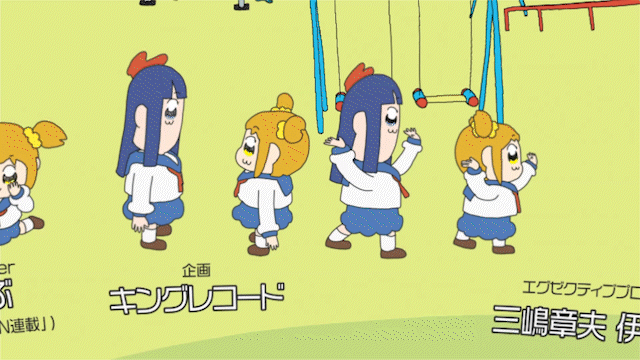
We've joked about how Popuko and Pipimi are less “characters” than they are “abstract joke delivery devices”, and that whatever personality traits they have are rooted mostly in the whims of any given sketch, not to mention whatever individual talents the voice actors bring to the table each week. The first few seconds of the OP make it brilliantly clear that this absence of self, the antipsyche of our heroines, is not merely a matter of comedic convenience, but rather a stroke of true artistic genius. We see the girls split into two versions of themselves, regard each other with genuine curiosity, and then split again, with each of their forms allotted only a single action within which to define their entire personality. In this modern world of TikToks and perpetual social media engagement, do we not ourselves confine every aspect of who we are and what we represent into easily digestible, often modular snippets of mere seconds' worth of our lifetimes? We reach out into the Void of Discourse with only the mercurial whims of the algorithm to buoy us along to whatever meager fragments of human interaction we can afford in our 240 characters, or our scant minutes of recording. This disassociation of the self is not presented with any sort of judgement or criticism by Popuko and Pipimi; indeed, they are themselves permanently trapped in that liminal psychic space of making as much impact with as little time or context as possible. This eternal machine of content regurgitation and recombobulation is neither a prison nor a grave; it is simply and certainly the entirety of our lived experience in this present moment, endlessly repeating from past to future.
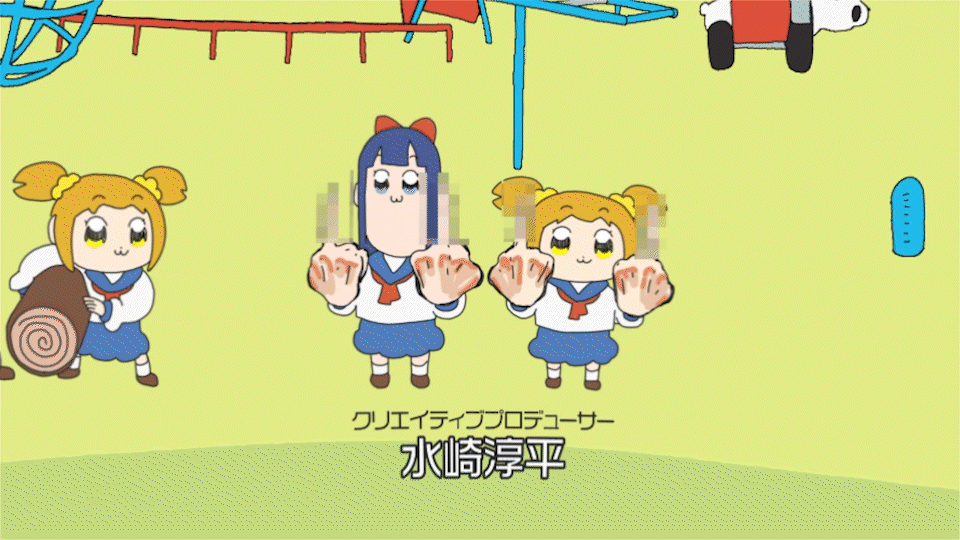
Here, at last, we see that our heroines will not be trapped in this cyclical façade; they will take whatever opportunities that they can to rebel against the Powers that Be, the unseen and possibly unhuman forces that work to preserve this infinite loop of self-immolation via shitposting. And yet, the OP forces us to consider the true limitations of our ability to successfully disengage with a capitalist machine that has so completely swallowed up and twisted every facet of society into a self-fellating parody death mask of itself. What good can such wordless rebellion serve if it will merely be copied and pasted ad nauseam onto T-shirts and mugs, lunchboxes, and novelty underwear? If the girls' extended digiti medius are their primary symbol for violent rejection of the psycho-social systems of abstracted economics that presently define the ego boundaries of our cultural interactions with one another and also ourselves, then we must reckon with the inescapable horror of seeing that symbol transubstantiated into a blasphemic logo for corporate profit.
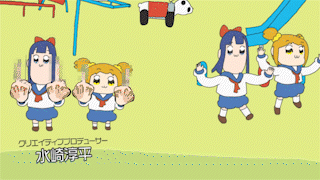
Here we get the first verse of Aoi's opus, and it provides a sort of thematic counterweight and complement to an already rich tapestry of sound-collage and imagistic bifurcation. The lyrics make a point to specifically to highlight the eternal conflict between those whose who pursue dogmatic “truths” in the inherently insubstantial pursuits of religion and onanistic navel-gazing and those who instead train their eyes away from “the way to heaven” and its “abstract philosophies” and focus their energies on deciphering the world of the here and now. Just as Popuko and Pipimi's bodies are being stretched and distorted into increasingly incoherent shapes and lines, we must fight to retain whatever perspective that is rooted in the experimental present as best we can, for therein lies our salvation.
I can only imagine that Aoi's are a direct allusion to, and dialogue with, the immortal words of esteemed thinkers such as Kant, who wrote in his seminal essay “The Critique of Pure Reason” (1781) that “That all our knowledge begins with experience there can be no doubt. For how is it possible that the faculty of cognition should be awakened into exercise otherwise than by means of objects which affect our senses, and partly of themselves produce representations, partly rouse our powers of understanding into activity, to compare to connect, or to separate these, and so to convert the raw material of our sensuous impressions into a knowledge of objects, which is called experience? In respect of time, therefore, no knowledge of ours is antecedent to experience, but begins with it.” That Pop Team Epic can evoke and even successfully recontextualize such ancient wisdoms in merely a few seconds of its opening theme is a testament to the raw and unbridled artistic power that we are dealing with.
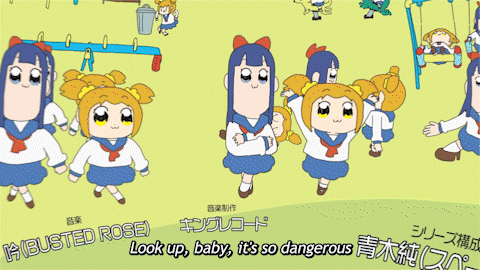
In the next lines, the OP seems to radically switch gears by evoking two of the twentieth and twenty-first centuries' greatest artistic milestones: Lady Gaga's pop smash “Poker Face”, and the Olsen Twins' landmark 1993 film, Double, Double, Toil and Trouble. However, if we take just a second to truly unpack this series of ostensibly irrelevant tangents, we can get an idea for how committed Pop Team Epic is to its own anti-philosophical throughlines.


The allusion to “Poker Face” is actually quite clever, if you consider the song's most prescient lyrics: “I won't tell you that I love you, kiss or hug you/'Cause I'm bluffin' with my muffin/I'm not lyin',/ I'm just stunnin' with my love-glue-gunnin'”. Obviously this OP is very much concerned with the epistemological ennui that is generated by the warped machinery of modern technocratic social oppression, and the inextricable marriage of fabricated self-perception and externalized actualization that results from it. Truly, all of us are “bluffin' with our muffins” every time we post a doctored selfie, or reblog an angry political meme with all of the half-hearted earnestness of Gaga's self-destructive persona in the song. If Popuko and Pimimi must be damned to this hell of eternal(ly online) recurrence, then so too are we all.
The connection to the Mary Kaye and Ashley joint is also searingly obvious. Consider, if you will, the film's most famous deconstruction of Western Capitalism's penchant for disenfranchising the oppressed by using the oppressed's own tools for self-ameliorating escapism:
Indeed, it is almost too obvious in context: Mary Kate and Ashley stand as the two symbols of affluent, white, suburban success, and we are helpless to watch as their hierarchical currency and uncanny phsycial resemblance to one another to perform what can only be described as colonially appropriated psychic black magicks on the children of color. By reciting such tired cliches as “This is a limited time offer! Take it or leave it” with their wicked, droll voices and their dead eyes, the villainous antiheroines at the center of Double Double, Toil and Trouble find themselves gladly weaponizing the same dark incantations of capitalism that have been used to swindle underrepresented communities out of their livelihoods since time immemorial. The question is, given their role as manufactured icons of advertisement, do Popuko and Pipimi represent the Olsen Twins, or are they the poor, blind masses who must willingly fork over their hard-won Halloween treats, again and again, every single time we press play on the Crunchyroll video steam app?
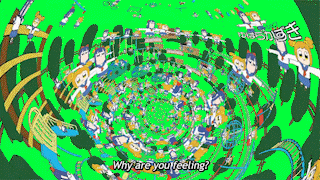
Naturally, as Popuko and Pipimi are forced to reckon with the paradox of their own anti-immaterialist goals being married to their inherently pro-capitalist, techno-imperialist origins, their entire world—and thus our perception of that selfsame world that we occupy on both a semi-conscious and submetacultural level—is irrevocably torn asunder by the gravity of its own self-annihilating contradictions. We are all immaterial girls, living in an anti-world.
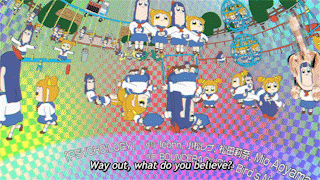
Finally, Pop Team Epic asks the question that must be asked by all great works of confrontational and introspective art, which comes as a shock that is so painful that it can be considered an act of both psychic and material assault, though it is a necessary one. It is the ego-sublimating pain of empathetic disassociation that is the natural byproduct of any work that forces you to rend the flesh of the “False Self” from the sinews of the “Real Skellington God Self” that lies beneath the bloody meat of societal structures in all of is. There is no proper English word to describe such wretched exaltation, though I suppose it can be most closely related to what the Germans call Scheissenfruede.
“What do you believe?“ asks Pop Team Epic. What can you believe, knowing what you know now?
Will Popuko and Pipimi survive this final, infinite unrendering of their psycho-self-idealizations, as we see happening on screen?
Jesus, will any of us survive?
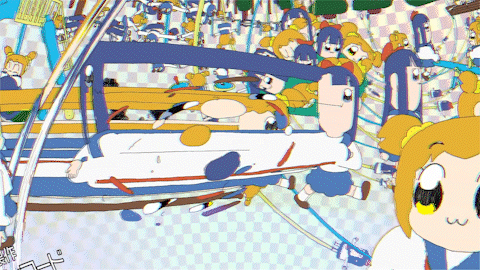
Anyways, I could go on for even more pages than this about what makes the new Pop Team Epic OP such a banger, but we can always come back around to that later. What we really ought to talk about now if Episode 6 itself! This is a review, after all. And if you want to know my honest opinion about everything that happened after the opening credits, well, I have to tell you, It's actually
Rating:
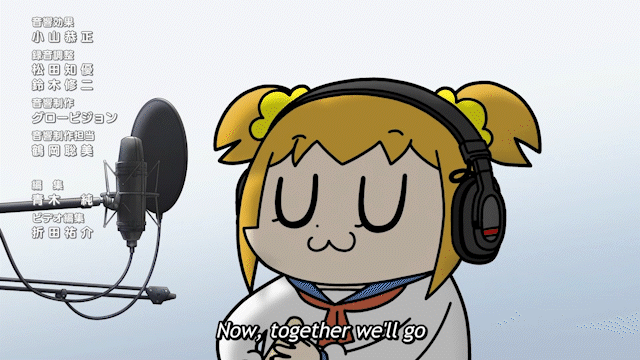
Pop Team Epic Season 2 is currently streaming on Crunchyroll.
discuss this in the forum (49 posts) |
back to Pop Team Epic Season 2
Episode Review homepage / archives